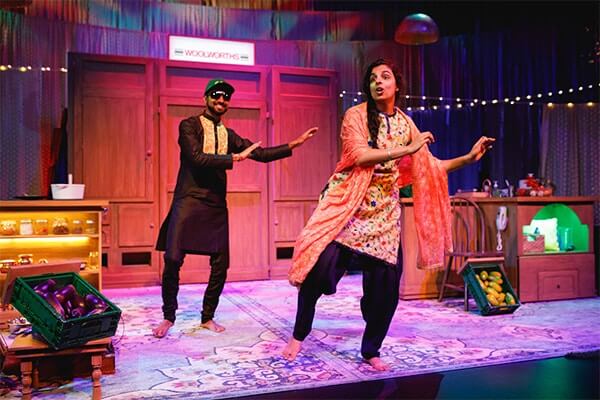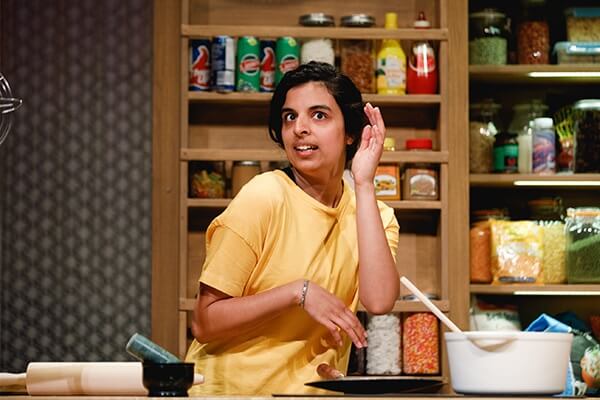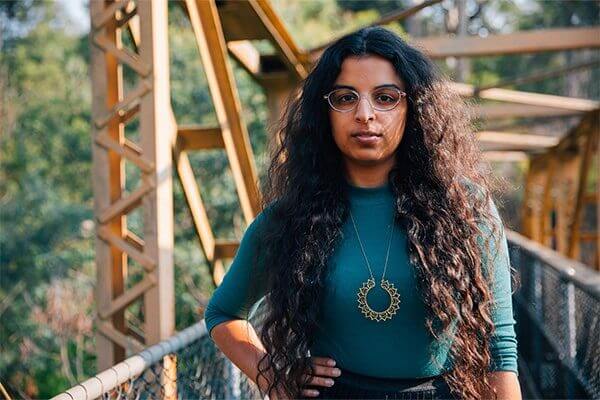A lot has changed for artist Sukhjit Kaur Khalsa since her breakthrough spoken word performance on Australia’s Got Talent in 2016 – she’s stronger, wiser, and was a WA Young Australian of the Year finalist.
The last few years have seen her diversify her practice, collaborating with Barking Gecko and Black Swan Theatre Company on her debut theatre production Fully Sikh, mount video installation work Between Breaths at Goolugatup Heathcote Art Gallery, and launch Saga Sisterhood, a performance project elevating South Asian women at The Centre for Stories. It’s experimentation borne out of the desire to collaborate and rekindle joy, according to Khalsa.

“During the pandemic, I just stopped. I started questioning my art, and whether I was still having fun or not. Sometimes you just need a little break, and to remind yourself why you became an artist,” she says.
“Performing spoken word poetry is quite lonely and I’ve been craving the energy of working in a team, bouncing off ideas. When I made Fully Sikh, it gave me a taste of collaboration.”
‘Educate yourself’
Though trying out these different mediums, she’s still creating art that sparks conversation. Her debut hip-hop single, Collectables, dissects tokenistic engagement with diverse communities, and comes from her frustration with the limits placed on diversity.
“I’ve been in the arts for ten years professionally, and I feel like when we talk about things on stage or on the page, the conversation isn’t going beyond some of these tokenistic gestures. I feel like I’m only useful when someone can mentor me, but still not seen as an equal. I think I’ll always be seen as ’emerging’ through a white lens,” she says.
It’s a message that extends to the whole South Asian community, and one that Khalsa wishes to carefully balance with mainstream artistic sensibilities.
“The song also touches on discrimination in the workplace and being seen as the ‘diversity hire’ – you’re happy for us to serve you food or be the Uber driver, but don’t want us in positions of power,” she says.
“I know I get put in the category of ‘activist’ and this puts people off, but I want to bring everyone along with me, because I can’t just keep talking to people who already agree. I want to make people think, but also make them dance.”
Through a Punjabi bridge section, Khalsa compels the Sikh community to recognise tokenism themselves, and be wary of subscribing to white narratives of power.
“That Punjabi verse is challenging my community – be careful aligning yourself with whiteness and laughing through racism,” she says. “I get it, I’m not judging, it’s survival, but I don’t want us to feel like the ‘good migrant’: ‘if I keep my head down and shut up, I will be rewarded.’ Will you actually be rewarded? I don’t think so. I’ve been the good migrant my whole life and it has punished me. I don’t want to live in that state anymore.”
“For me, being Sikh is about social justice, and not being afraid to speak up. I know that verse is not going to sit well with everyone, but I hope that people will understand that it is coming from my heart. I care so much about our community – even if they give me hate, I will always care.”
From Fully Sikh to scaling new peaks
Khalsa is no stranger to hostility; in 2016 when To Advance Australia Fair went viral, it attracted everything from praise to death threats, not only in the mainstream, but from within the Sikh community, something that was deeply confronting for the then 21-year-old. This whirlwind of online love and hate have made her acutely aware of being the ‘Sikh poster child’.
“During the [AGT pre-act interview] they really wanted to talk about my love life. At that time, I was like, ‘I’m a Sikh girl, I can’t talk about this stuff on national television. There’s a lot of people I admire that would’ve said ‘I’m gonna speak my truth’ – that’s great, that works for you, but I still don’t think I could go public [with a love life],” she reflects.
This pressure to be a ‘good Sikh’ is something she’s just starting to unpack, and she notes how gendered expectations and centring her previous work around Sikh identity have contributed to these feelings.
“I think [I’m concerned] if people get to know me, they won’t think I’m Sikh enough. I want young people from my community to be allowed to access my work, and if their parents don’t approve of me, then I worry that I’ve lost that family’s support.”
Khalsa’s latest multidisciplinary works are a step towards a more holistic, nuanced understanding of identity.

“We don’t need to hand hold anymore. We’re moving past overexplaining. Even in my bio, I used to have ‘Sukhjit is an Australian Sikh etc’, now it’s just ‘Sukhjit is an artist.’ People interpret what they want and take what they want to take, but I know what I want to do and what I’m proud of,” she says.
After a decade in the industry, Sukhjit Kaur Khalsa’s role as a ‘cultural translator’ of sorts has shifted.
“I’ve learnt a lot of things being in the arts, and I feel like I can use that knowledge to help anyone who hasn’t been let into the system. I think that’s where I want to be a translator, to create opportunities.”
READ ALSO: Sukhjit Kaur Khalsa at the Melbourne International Comedy Festival





